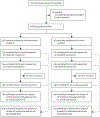Strengthening resilience to reduce HIV risk in Indian MSM: a multicity, randomised, clinical efficacy trial
- PMID: 33740407
- PMCID: PMC8091574
- DOI: 10.1016/S2214-109X(20)30547-7
Strengthening resilience to reduce HIV risk in Indian MSM: a multicity, randomised, clinical efficacy trial
Abstract
Background: Men who have sex with men (MSM) in India are extremely marginalised and stigmatised, and therefore experience immense psychosocial stress. As current HIV prevention interventions in India do not address mental health or resilience to these stressors, we aimed to evaluate a resilience-based psychosocial intervention in the context of HIV and sexually transmitted infection (STI) prevention.
Methods: We did a multicity, randomised, clinical efficacy trial in Chennai (governmental tuberculosis research institute) and Mumbai (non-governmental organisation for MSM), India. Inclusion criteria were MSM, aged 18 years or older, who were at risk of HIV acquisition or transmission, defined as having any of the following in the 4 months before screening: anal sex with four or more male partners (protected or unprotected), diagnosis of an STI, history of transactional sex activity, or condomless anal sex with a man who was of unknown HIV status or serodiscordant. Participants were required to speak English, Tamil (in Chennai), or Hindi (in Mumbai) fluently. Eligible individuals were randomly assigned (1:1) to either a resilience-based psychosocial HIV prevention intervention, consisting of group (four sessions) and individual (six sessions) counselling alongside HIV and STI voluntary counselling and testing, or a standard-of-care control comprising voluntary counselling and testing alone. The primary outcomes were number of condomless anal sex acts with male partners during the past month (at baseline and 4 months, 8 months, and 12 months after randomisation), and incident bacterial STIs (at 12 months after randomisation). Resilience-related mediators included self-esteem, self-acceptance, and depression. Recruitment is now closed. This trial is registered with ClinicalTrials.gov, NCT02556294.
Findings: Between Sept 4, 2015, and June 28, 2018, we enrolled 608 participants; 305 (50%) were assigned to the psychosocial intervention condition and 303 (50%) were assigned to the control condition. 510 (84%) of 608 men completed an assessment at 4 months after randomisation, 483 (79%) at 8 months, and 515 (85%) at 12 months. 512 (99%) of 515 men had STI data from the 12-month assessment. The intervention condition had a 56% larger reduction in condomless anal sex acts (95% CI 35-71; p<0·0001) from baseline to 4-month follow-up, 72% larger reduction (56-82; p<0·0001) from baseline to 8-month follow-up, and 72% larger reduction (53-83; p<0·0001) from baseline to 12-month follow-up, compared with the standard-of-care control condition (condition by time interaction; χ2=40·29, 3 df; p<0·0001). Improvements in self-esteem and depressive symptoms both mediated 9% of the intervention effect on condomless anal sex acts. Bacterial STI incidence did not differ between study conditions at 12-month follow-up.
Interpretation: A resilience-based psychosocial intervention for MSM at risk of HIV acquisition or transmission in India was efficacious in reducing condomless anal sex acts, with evidence for mediation effects in two key target resilience variables. HIV prevention programmes for MSM in India should address mental health resilience to augment reductions in the risk of sexually transmitted HIV.
Funding: National Institute of Mental Health.
Copyright © 2021 The Author(s). Published by Elsevier Ltd. This is an Open Access article under the CC BY-NC-ND 4.0 license. Published by Elsevier Ltd.. All rights reserved.
Conflict of interest statement
Declaration of interests
SAS receives royalties from Oxford University Press, Guilford Publications, and Springer (Humana), outside of the submitted work. All other authors declare no competing interests.
Figures



Comment in
-
Time for a more holistic approach to HIV prevention for men who have sex with men?Lancet Glob Health. 2021 Apr;9(4):e377-e378. doi: 10.1016/S2214-109X(21)00101-7. Lancet Glob Health. 2021. PMID: 33740399 No abstract available.
References
-
- UNAIDS. Country factsheets: India. 2018. https://www.unaids.org/en/regionscountries/countries/india (accessed July 2, 2020).
-
- Ministry of Health and Family Welfare. Annual report 2018–2019. National AIDS Control Organization. New Delhi: Ministry of Health and Family Welfare, 2019.
-
- Government of India. 2011 Census data. 2011. https://censusindia.gov.in/2011-common/censusdata2011.html (accessed July 2, 2020).
-
- Chakrapani V, Newman PA, Shunmugam M, McLuckie A, Melwin F. Structural violence against Kothi-identified men who have sex with men in Chennai, India: a qualitative investigation. AIDS Educ Prev 2007; 19: 346–64. - PubMed
Publication types
MeSH terms
Associated data
Grants and funding
LinkOut - more resources
Full Text Sources
Other Literature Sources
Medical
Research Materials
Miscellaneous

